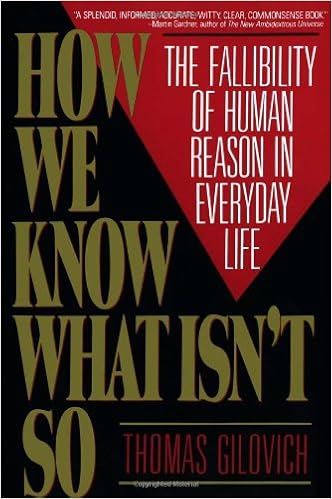
How We Know What Isn't So: The Fallibility Of Human Reason In Everyday Life Download Free (EPUB, PDF)

Thomas Gilovich offers a wise and readable guide to the fallacy of the obvious in everyday life.When can we trust what we believe—that "teams and players have winning streaks," that "flattery works," or that "the more people who agree, the more likely they are to be right"—and when are such beliefs suspect? Thomas Gilovich offers a guide to the fallacy of the obvious in everyday life. Illustrating his points with examples, and supporting them with the latest research findings, he documents the cognitive, social, and motivational processes that distort our thoughts, beliefs, judgments and decisions. In a rapidly changing world, the biases and stereotypes that help us process an overload of complex information inevitably distort what we would like to believe is reality. Awareness of our propensity to make these systematic errors, Gilovich argues, is the first step to more effective analysis and action.

Paperback: 224 pages
Publisher: Free Press; Reprint edition (March 5, 1993)
Language: English
ISBN-10: 0029117062
ISBN-13: 978-0029117064
Product Dimensions: 6.1 x 0.6 x 9.2 inches
Shipping Weight: 8.8 ounces (View shipping rates and policies)
Average Customer Review: 4.4 out of 5 stars See all reviews (91 customer reviews)
Best Sellers Rank: #33,502 in Books (See Top 100 in Books) #12 in Books > Textbooks > Humanities > Philosophy > Logic #27 in Books > Politics & Social Sciences > Philosophy > Logic & Language #49 in Books > Textbooks > Social Sciences > Psychology > Cognitive Psychology

Mr. Gilovich says ". . . there are inherent biases in the data upon which we base our beliefs, biases that must be recognized and overcome if we are to arrive at sound judgments and valid beliefs." The cost of these biases is real and severe. This book explains why people are prone to wrong thinking, and ways they can counteract this.Here are points that Mr. Gilovich made:1. Seeing Order in Randomness - We all have a natural tendency to see order in data, even when the data is totally random and irregular. We do this even when we have no personal reason to see order. This happens especially when we remember facts from the past. Our memory plays tricks on us by emphasizing any possible patterns, and forgetting irregularities that might refute the patterns. For instance, basketball players often think that if they make one successful basket, then they are more likely to make the next basket - because they remember times when this has happened to them. "When you're hot, you're hot." However, objective statistical studies done on when successful baskets are made show that, if anything, the opposite is true.This natural tendency to misconstrue random events is called the "clustering illusion." Chance events often seem to us to have some order to them, but when the law of averages is applied objectively, this order disappears. This error is compounded when our active imagination tries to create theories for why there should be order. Because of this, we need to be careful when we draw conclusions based on a sequence we think we see in some data.2. Looking for Confirmation - We all have a natural tendency to look for "yes" instead of "no." If we have an idea, we tend to look for evidence that will confirm our idea, not evidence that will disprove it.
How We Know What Isn't So: The Fallibility of Human Reason in Everyday Life Nursing: Human Science And Human Care (Watson, Nursing: Human Science and Human Care) Logic and Contemporary Rhetoric: The Use of Reason in Everyday Life Renaissance: Everyday Life (Everyday Life (Good Year Books)) Descartes' Error: Emotion, Reason, and the Human Brain Why the Jews?: The Reason for Anti-Semitism, the Most Accurate Predictor of Human Evil What Your CPA Isn't Telling You: Life-Changing Tax Strategies The Everyday Life Bible: The Power of God's Word for Everyday Living Human Caring Science: A Theory of Nursing (Watson, Nursing: Human Science and Human Care) If This Isn't Nice What Is?, (Much) Expanded Second Edition: The Graduation Speeches and Other Words to Live By If This Isn't Nice, What Is?: Advice to the Young-The Graduation Speeches This Isn't What I Expected [2nd edition]: Overcoming Postpartum Depression This Isn't What I Expected: Overcoming Postpartum Depression Planning Isn't My Priority (Functioning Executive) Karma: What It Is, What It Isn't, Why It Matters The War Against Putin: What the Government-Media Complex Isn't Telling You About Russia Book of Extremes: Why the 21st Century Isn't Like the 20th Century Isn't It Obvious? Revised Edition Isn't It Obvious? Isn't It Obvious? Revised



